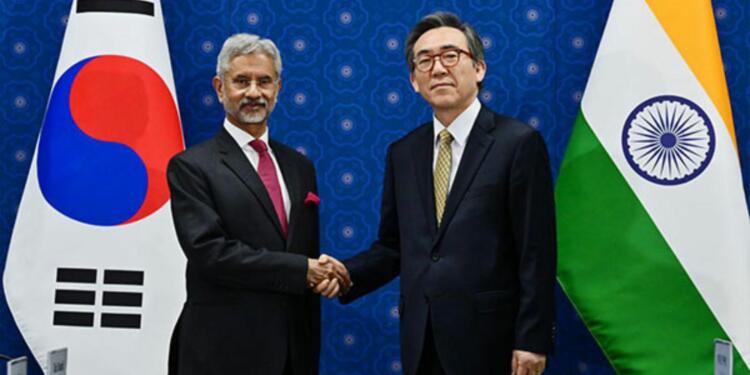Indian External Affairs Minister S Jaishankar, speaking at the Raisina Roundtable in Tokyo, expressed apprehensions regarding China’s disregard for written agreements with neighboring countries. Stressing the importance of upholding international agreements for stability, he delved into the Indo-Pacific’s changing dynamics and the strategic implications of power shifts in the region. Jaishankar’s remarks underline the criticality of adhering to agreements and navigating geopolitical shifts to foster enduring and stable relationships.
China’s Disregard for Agreements
Jaishankar’s reference to India’s historical relationship with China underscores the significance of adherence to agreements. The period of peace preceding the 2020 escalation highlights the potential for stability when agreements are respected. By emphasizing the importance of upholding written agreements, Jaishankar suggests that such actions not only reflect a commitment to established norms but also demonstrate a country’s reliability and trustworthiness as a partner. Failure to honor agreements raises concerns about a nation’s intentions and casts doubt on the stability of its relationships.
In a region as strategically vital as the Indo-Pacific, where numerous countries coexist with varying interests and ambitions, mutual respect and adherence to international norms are essential for maintaining peace and stability. Jaishankar’s remarks serve as a reminder of the critical role agreements play in fostering trust and cooperation among nations, and the repercussions that arise when they are disregarded. As such, his statements echo a broader call for accountability and adherence to established principles in international relations to mitigate tensions and promote harmonious coexistence in the Indo-Pacific and beyond.
Indo-Pacific Power Shifts
Jaishankar’s acknowledgment of significant power shifts in the Indo-Pacific region underscores the evolving geopolitical landscape and its consequential effects. These shifts bring about both challenges and opportunities, impacting political and strategic dynamics in the region.
The emergence of new power centers and the realignment of existing alliances require proactive engagement and strategic foresight from all stakeholders. By recognizing these changes, nations can better navigate the complexities of the Indo-Pacific and adapt their policies accordingly. Jaishankar’s emphasis on proactive engagement highlights the importance of fostering dialogue and cooperation among regional actors to address common challenges and capitalize on emerging opportunities.
Furthermore, his call for strategic foresight underscores the need for long-term planning and flexibility in response to evolving geopolitical realities. Ultimately, Jaishankar’s remarks serve as a reminder of the imperative for nations to remain vigilant and proactive in shaping the future of the Indo-Pacific, ensuring stability, prosperity, and security for all stakeholders involved.
Also Read: The Great AI Breach: Google, China, and the Stolen Secrets
India’s Global Engagements
Jaishankar’s commendation of India’s expanding global engagements reflects the country’s proactive approach to international relations. Recent Free Trade Agreements with Australia and UAE signify India’s commitment to fostering mutually beneficial economic partnerships. Ongoing negotiations with the UK and the EU demonstrate India’s resolve to deepen economic ties with key global players. Additionally, Jaishankar’s stress on India’s engagement with the Middle East highlights the region’s strategic significance and India’s efforts to navigate its complexities while strengthening bilateral relations.
This multifaceted approach underscores India’s evolving role as a key player in the global economic and geopolitical landscape. By prioritizing diplomatic and economic engagements with diverse partners, India seeks to enhance its influence and contribute to regional and global stability and prosperity. Jaishankar’s remarks reaffirm India’s commitment to constructive engagement and cooperation on the world stage, positioning the country as a reliable and proactive partner in addressing global challenges and advancing shared interests.
Opportunities Amidst Russia-Ukraine Conflict
Jaishankar’s analysis of the Russia-Ukraine conflict sheds light on its broader implications for global dynamics, particularly Russia’s strategic pivot towards Asian countries. Amidst escalating tensions with the West, Russia seeks to diversify its partnerships and reduce reliance on traditional allies. This presents a significant opportunity for India and other Asian nations to deepen cooperation and collaboration with Russia.
By leveraging Russia’s interest in strengthening ties with Asian partners, India can enhance bilateral relations across various sectors, including trade, energy, defense, and technology. Closer collaboration with Russia could also bolster India’s regional influence and contribute to stability in the Indo-Pacific region.
Furthermore, enhanced cooperation with Russia could lead to joint initiatives and investments in infrastructure projects, energy exploration, and technological innovation. This could stimulate economic growth and create employment opportunities in both India and Russia.
Additionally, increased engagement with Russia aligns with India’s broader strategy of diversifying its diplomatic and economic partnerships. By cultivating stronger ties with Russia, India can mitigate risks associated with geopolitical uncertainties and strengthen its position as a key player on the global stage.
In conclusion, Jaishankar’s remarks emphasize the imperative of honoring international agreements and adapting to evolving geopolitical dynamics in the Indo-Pacific. India’s proactive engagement with global partners, backed by strategic foresight, enables it to effectively navigate challenges and capitalize on opportunities in an ever-changing geopolitical landscape. By upholding principles of mutual respect and cooperation, India can foster stability and prosperity in the region while solidifying its position as a key player on the global stage. Jaishankar’s insights underscore India’s commitment to constructive diplomacy and proactive leadership in shaping a more peaceful and prosperous world.
Also Read: Mama, I’m in Love with a Criminal: Witness The Gangster Wedding

























